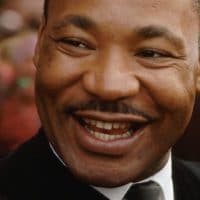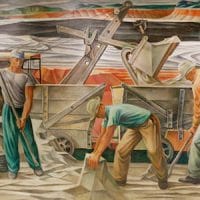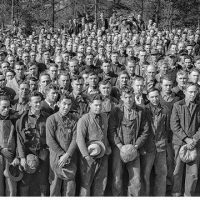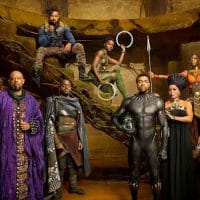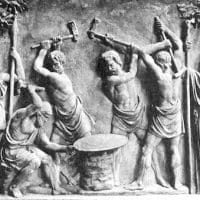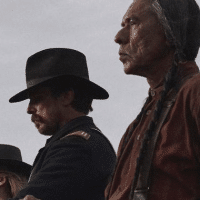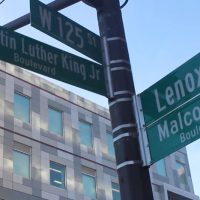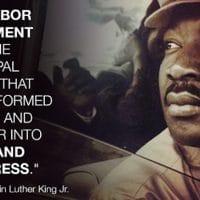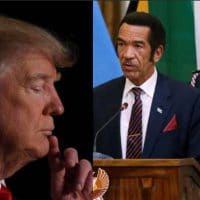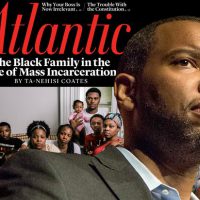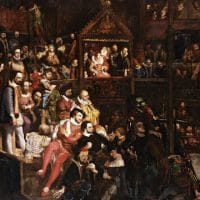-
MLK: A snap shot in time
The line of preachers stretched 100 yards to the door of Columbus, Georgia’s radio station WOKS, where the pastors had each been allotted a few minutes to testify to their deep commitment to the ideals espoused by Dr. Martin Luther King, Jr., shot down in Memphis three days earlier. Nearly every Black minister in town was there, waiting his turn to lie. Although they would sound like an amen corner for “the Movement” on this mournful Sunday morning, the assembled clergymen had, in fact, acted as the front line of resistance to King’s gospel of nonviolent confrontation with the white powers-that-be.
-
What’s a non-racist way to appeal to working-class whites? NYT‘s Edsall can’t think of any
The 2016 presidential exit polls “substantially underestimated the number of Democratic white working-class voters…and overestimated the white college-educated Democratic electorate,” New York Times columnist Thomas Edsall (3/29/18) writes.
-
Race traitors wanted: apply within
The term “white working class” captured much of the media analysis which sought to explain Trump’s meteoric rise and subsequent victory to the highest office in the United States. The obsession with polling and voting trends based in demographics is certainly nothing new.
-
‘Black Panther’ is not the movie we deserve
Even in a comic-book movie, black American men are relegated to the lowest rung of political regard. So low that the sole white leading character in the movie, the CIA operative Everett Ross (Martin Freeman), gets to be a hero who helps save Wakanda.
-
Finding ways to be one: The making of Cedric J. Robinson’s radical Black politics.
Historian Robin D.G. Kelley explores the radical Black politics of scholar Cedric J. Robinson—from his historical understanding of race and capitalism as inherently inseparable systems, to his vision of the possibilities of politics, rooted deep in struggles past and present.
-
The gong of history; or, what is a human?
Every great historical epoch in the freedom struggle raises the question: what is a human? The answer changes, to quote Askia Muhammad Toure of the Revolutionary Action Movement, with “the Gong of History.” Amid all the confusing din of history, a note may sound that makes it audible and intelligible.
-
An apology for imperialism in a colourful package
We all know that Hollywood movies are fictional, right? Even the ones “based on actual events”? But at some level, if a fictional film references actual history and includes stunning visuals, great acting, and a powerful musical score, it can become accepted and internalized as “the truth.”
-
Bill Fletcher Jr. on Black Marxism
Veteran labor activist Bill Fletcher jr. talks about how capitalism is based on the slave trade and colonialism, the Black contribution to Marxism, and the need to organize.
-
Remembering King’s roots in labor and socialist movements of the 20th century
As we celebrate Martin Luther King Jr. weekend, it’s worth remembering that his legacy was based firmly in the labor and the socialist movements of the 20th century. It takes nothing away from King to highlight how his work built on those movements and his voice was magnified by his association with them.
-
The U.S. role in turning countries into shitholes and provoking immigration
Since Trump is a racist, he thinks that countries get to have poor economic and security situations because of the race of the people that inhabit them. That is silly (and dangerous) as history and social science.
-
Class, race, and U.S. wealth inequality
People tend to have a distorted picture of U.S. capitalism’s operation, believing that the great majority of Americans are doing well, benefiting from the system’s long-term growth and profit generation. Unfortunately, this is not true. Median wealth has been declining, leaving growing numbers of working people increasingly vulnerable to the ups and downs of economic […]
-
What is racial capitalism and why does it matter?
Talk by Robin D. G. Kelley on “What is Racial Capitalism and Why Does It Matter?” recorded November 7, 2017 at Kane Hall, University of Washington, Seattle, WA. Sponsored by the UW Simpson Center for the Humanities.
-
The meritocratic myopia of Ta-Nehisi Coates
A question that might sound ludicrous to some: what do Trump and liberals have in common? Answer: a penchant for discussing anything other than class and capitalism—seriously.
-
Balfour at 100: A legacy of racism and propaganda
The coming months mark the centennial of Palestine’s forcible incorporation into the British Empire. In November 1917, British foreign secretary Lord Arthur Balfour declared his government’s support for “the establishment in Palestine of a national home for the Jewish people”; in December, Jerusalem fell to British troops.
-
W. E. B. Du Bois’s “Black Reconstruction” and the new (Marxist) historiography
What follows is the paper I gave this past weekend at the ninth annual meeting of the Society for U.S. Intellectual History in Dallas. I received excellent comments from our chair, Amy Wood, and from several audience members–comments that have made me rethink some of my argument. But I publish here without editing in the hopes that I receive more comments.
-
The Anti-Empire Report #152
If newness doesn’t win everyone’s heart, then BEAUTIFUL will definitely do it. Who likes UGLY military equipment? Even the people we slaughter all over the world insist upon good-looking guns and bombs.
-
Radicalizing women’s rights internationally
The recent “burqa bans” in Austria and Quebec appear to be troubling legal manifestations of the rising tide of Islamaphobia in Europe and North America.
-
How American racism shaped nazism
Depending on the reader’s perspective, Whitman’s central argument seems either modest or bold, as he claims, “What all this research unmistakably reveals is that the Nazis did find precedents and parallels and inspirations in the United States” (10). The most radical Nazis were often the most enthused about American legal precedents. More moderate, less anti-Semitic members of the Nazi Party tended to be more skeptical of American approaches. For some Nazis, “American race law looked too racist” (5). America “was the leading racist jurisdiction” in the 1930s (138).
-
How ‘white people’ were invented by a playwright in 1613
The Jacobean playwright Thomas Middleton invented the concept of ‘white people’ on 29 October 1613, the date that his play The Triumphs of Truth was first performed. The phrase was first uttered by the character of an African king who looks out upon an English audience and declares: ‘I see amazement set upon the faces/Of these white people, wond’rings and strange gazes.’
-
FBI launches COINTELPRO 2.0, targeting ‘black identity extremists’
Raise your hand if you identify as a “black identity extremist.” Matter of fact, raise your hand if you’ve ever even heard of the term “black identity extremist.”

